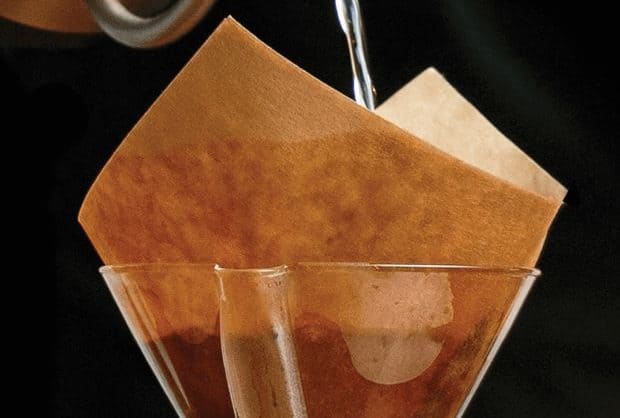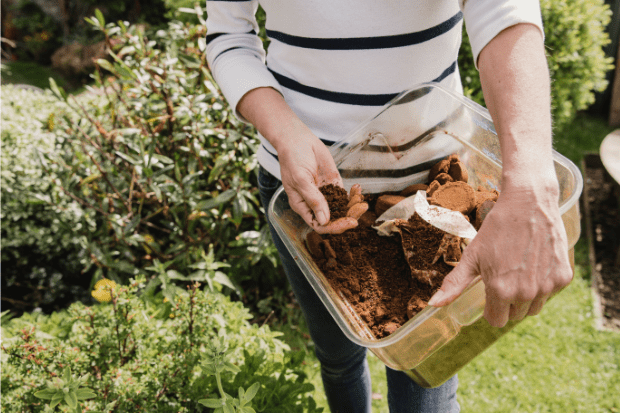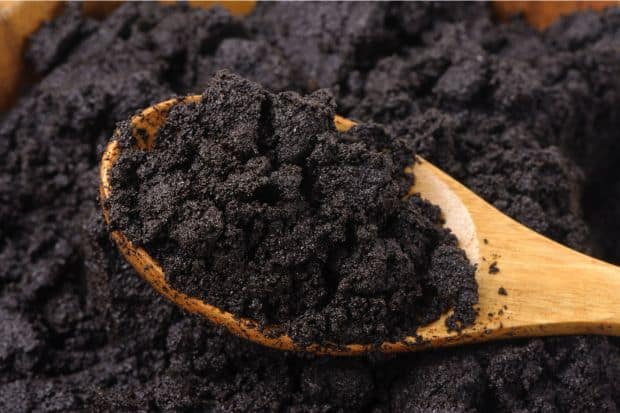Just so you know, as an Amazon Associate we earn from qualifying purchases made via bold red links, buttons or images.
Last Updated on December 10, 2023
Chemex makes a popular style of pour-over coffee brewer and offers several types of filters to fit their range of coffee makers. In this article, we’re going to look at the Chemex brewing process and how to best dispose of their biodegradable paper coffee filters.
Chemex coffee filters are used with the Chemex Pour-Over Glass Coffeemaker:
https://m.media-amazon.com/images/I/41oJxvqxcqL._SL160_.jpg
Check availability
Are Chemex Filters Compostable?
Chemex filters are extremely compost-friendly because they’re made without harsh dyes or bleach that can leach into soil when broken down.
The best way to dispose of used coffee grounds is in the compost pile, whether you have municipal compost collection or your own backyard setup. Composting is the best way to capture gases from used coffee grounds and utilize them for our benefit rather than releasing them into the atmosphere.
If you process your own backyard compost heap, coffee grounds add nitrogen, phosphorus, and potassium to the mixture, making it ideal for adding to your garden. Since paper breaks down more slowly than food waste, you can tear your coffee filters into smaller pieces to encourage a speedier decomposition process.
Most coffee filters are compostable, as paper is safe to add to any composting process as long as it’s free of harsh chemicals and dyes. When using store-bought coffee filters, it’s important to check whether they’re treated with chlorine—particularly if you process your own compost.
Chemex’s natural brown filters are unbleached and completely free of harsh chemicals.
https://m.media-amazon.com/images/I/41vxMUkKejL._SL500_.jpg
Check availability
If you prefer a more classic, fresh look, Chemex offers white coffee filters that are treated with oxygen bleach. Oxygen bleach is relatively safe for both your health and the environment, being free of chlorine and breaking down into just water, oxygen, and natural soda ash.
https://m.media-amazon.com/images/I/314gT1KMXIL._SL500_.jpg
Check availability
All Chemex filters are fully biodegradable and even septic-safe.
Why Chemex Filters?
A Sustainable Choice
Sustainability is no longer a buzzword—it’s a necessary way forward and something many people are actively trying to incorporate into their lives. Our current food systems are far from sustainable, and it can often feel like there is little we can do as individuals to make a difference. When something as integral as our daily coffee consumption can be made more sustainable, it’s an obvious and easy choice to jump on.
There are many elements of our coffee routine that contribute to its overall footprint. Choosing flavorful coffee beans that are grown with both the environment and the growers as top priorities is one of the best things you can do. You can also control how much landfill waste you create as a result of brewing coffee. How you dispose of that waste is of great consequence as well.
Chemex brand filters are more expensive than other brands, but I argue they’re well worth the investment. If sustainability is a top priority for you, and you have the means, you can take comfort in the fact that not only does Chemex take the extra steps mentioned above, such as using oxygen bleach rather than harsh chemicals, but they also ensure that the paper they use comes from sustainable sources.
Filter paper for all Chemex filters is sourced from trees that have been harvested with practices that conform to the standards of the Forest Stewardship Council, the Programme for the Endorsement of Forest Certification, or the Sustainable Forestry Initiative. These programs ensure that forests under their auspices are being harvested to encourage biodiversity and that social and economic stability always remain a top priority.
A Quality Choice
Chemex products are crafted with care and attention. Their coffee paper filters are designed to specifically fit their products, so not only are they easier to handle, but they’re also less messy and will almost always fit perfectly. Chemex filters are thicker than most other paper filters, straining out more solids, resulting in a bright, clean, nuanced cup of coffee.
A Transparent Choice
Chemex is very transparent with their supply chain, and they make a concerted effort on all fronts to minimize the footprint of their products. They use recycled materials for packaging and printing, and they encourage the upcycling of chipped or broken carafes into custom housewares, such as lighting fixtures or flower pots.
They also keep production as local as possible. Transportation is a huge contributor to the overall footprint of any product, so keeping things as local as possible not only contributes to your community’s economy but also has a substantial, measurable impact on the sustainability of a product.
Final Thoughts
There are many brands that claim to make sustainability a priority, but it often turns out to be lip service or greenwashing. Using 20 per cent recycled materials in your packaging is not going to make much difference overall.
Chemex, on the other hand, takes the footprint of their products into consideration at every stage of production and distribution. They have a holistic approach that tells you it’s not a marketing gimmick but rather a core value and philosophy of the company.
This does translate into a higher price for their products, and I’m not ignorant to the inequities present in the sustainability movement. For eco-friendly coffee lovers who do have the means and want to reduce their household footprint, supporting companies like Chemex is well worth the investment. On our end, it doesn’t get much easier than popping your used Chemex coffee filters into the compost bin to make your coffee drinking experience a little more sustainable.
Next, learn how to keep your Chemex coffee warm!




